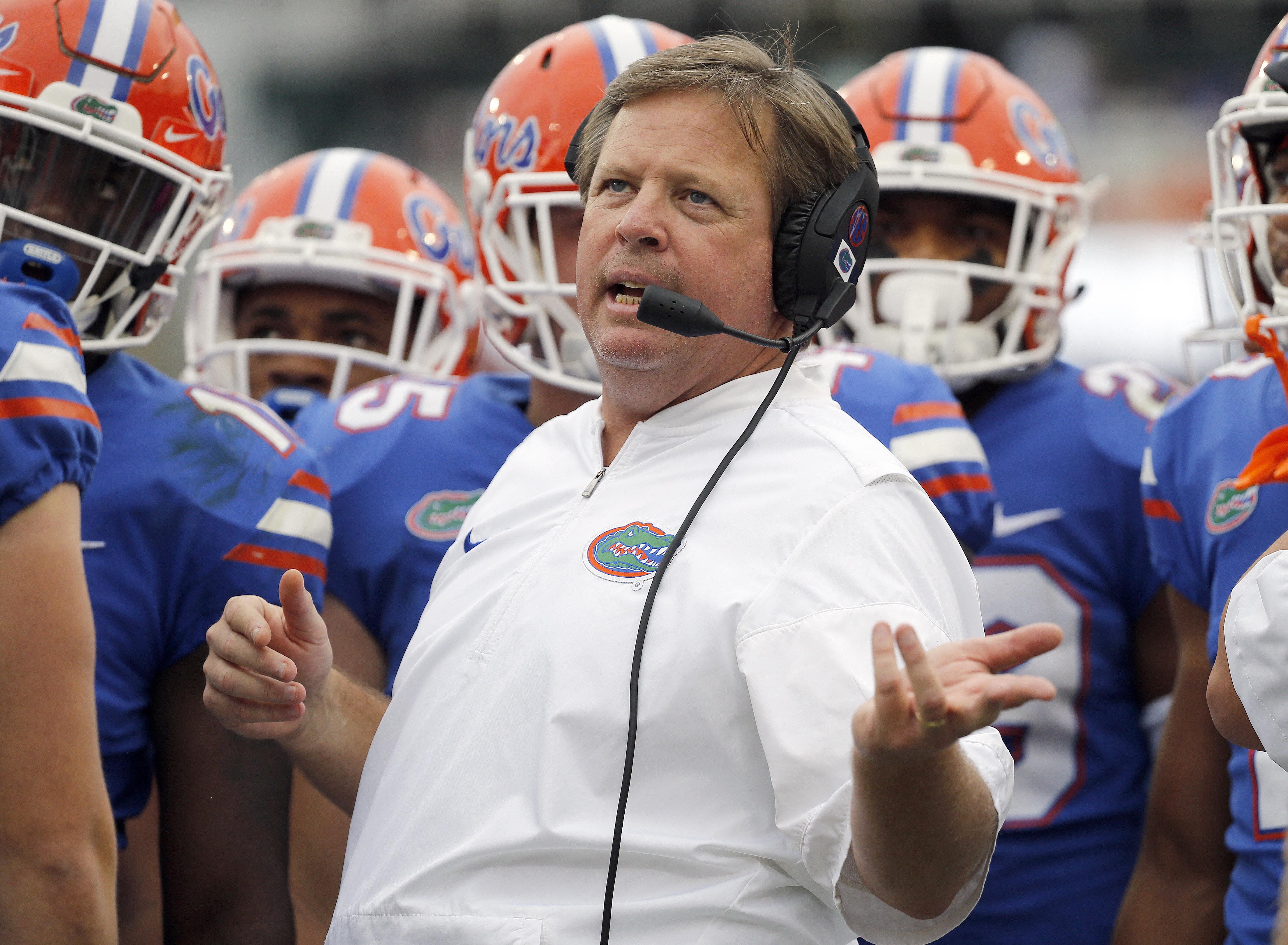
Fire McElwain for cause? UF would face tough, expensive legal battle it might not win
GAINESVILLE — Speculation about Jim McElwain’s future at Florida began circulating well before Florida’s embarrassing 42-7 loss to Georgia Saturday in Jacksonville.
In truth, whispers McElwain might be losing his grip on the Florida job began earlier this week, when he said at his Monday press conference that he, his family and players had received death threats.
“There’s a lot of hate in this world and a lot of anger,” McElwain told the media Monday. “And yet it’s freedom to show it. The hard part is obviously when the threats (are) against your own players, the death threats to your families, the ill will that’s brought upon out there.”
When asked follow-up questions about the nature of the threats, McElwain balked, refusing to discuss the matter outside of indicating he had not contacted law enforcement.
Later that evening, the University Athletic Association released an odd statement, noting it had met with Coach McElwain and he had “not elaborated” on the death threat claims.
This set off days of speculation over whether McElwain had fabricated the story, and that speculation only subsided slightly when McElwain finally acknowledged Wednesday evening he should not have said anything and had “let the clutter” impact him.
I’m sure McElwain hoped that would end the story, but it didn’t go away. Fans and longtime media members and writers noted McElwain’s comments had embarrassed the university, and asked whether the unsubstantiated remarks could ultimately impact his standing as Florida’s football coach.
That anger, and questions about McElwain’s job security, resurfaced in earnest Saturday, when Darren Heitner, an agent, UF Law alum and sports law expert, tweeted that he had heard negotiations over Jim McElwain’s $12.9 million buyout were ongoing between the Florida administration and McElwain’s agent, Jimmy Sexton.
Heitner’s tweet set off a firestorm of speculation even before the World’s Largest Outdoor Cocktail Party kicked off, and the noise was loud enough that the University of Florida Athletic Association and athletic director Scott Stricklin responded to the rumors with following statement:
“No one representing the University of Florida or our athletic department has had any conversations with Coach McElwain or his representatives regarding a buyout of his contract,” Stricklin said in a statement. “Our focus is on this great Florida-Georgia rivalry today in Jacksonville.”
Here’s the thing: The “great” Florida-Georgia rivalry Saturday in Jacksonville was a fiasco. The Gators were embarrassed and never stood a chance, suffering a knockout blow early in the first quarter and hardly showing any signs of getting off the mat. McElwain acknowledged his failures in the post-game press conference.
“I know what I was brought here to do: to fix the offense,” McElwain said. “And we haven’t done that. We haven’t won enough, and we haven’t won championships.”
That much is correct.
But the speculation circulating Saturday evening that McElwain might be fired for cause raises another set of questions entirely.
Presumably, the argument for firing McElwain “for cause” stems from a portion of his contract forbidding him from violating or overseeing conduct that flagrantly violates NCAA rules or personally engaging in conduct that embarrasses the University of Florida. That’s a bit more complicated than it sounds.
While the University of Florida and its lawyers might be counting on McElwain’s odd “death threat” claims as being sufficient to advance a legal argument the coach has embarrassed the university, they’ll likely need more than that to prevail in any legal action.
In fact, the law would require both proof that McElwain fabricated the death threats and that his decision to do so materially damaged the University of Florida.
Neither will be easy to prove.
Even one email, letter, phone message or tweet evidencing a death threat would alleviate concerns in the McElwain camp about Probem 1. And even absent that type of evidence, Florida would have difficulty proving that McElwain’s actions did anything beyond give UF and its fan-base a short-term black eye for being crazy. The reality is it might be more embarrassing to lose 42-7 to a rival, but contracts have long been written to excuse on-field failures.
It seems likely that the University Athletic Association knows it is behind on the “for cause” argument, and hope to use the “death threat” incident as leverage in any buyout negotiations.
The problem for Florida there, however, is what happens if Jimmy Sexton — a respected agent in the coaching industry — calls their bluff. Sexton and McElwain might be willing to litigate the “for cause” question, alleging there’s not enough there, and putting UF at substantial risk of a negative verdict, which could add hundreds of thousands of dollars in attorneys’ fees to any buyout when all is said and done.
In the best-case scenario, Florida’s lawyers could hope the “death threats” incident, coupled with the credit card suspensions and pending litigation over the Antonio Callaway Title IX investigation might create a cumulative case for termination “for cause.” But this too seems less like a quality “for cause” case and more like a potentially effective buyout negotiation mechanism.
Bottom line? If Florida elects to terminate McElwain “for cause,” it should prepare for lengthy litigation on the question of whether McElwain’s conduct rises to a level justifying termination “for cause.”
The thinking here is that’s not an argument the University of Florida can win.
And that’s a reality that makes a messy situation even more complicated, and potentially, more expensive.
Neil Blackmon covers Florida football and the SEC for SaturdayDownSouth.com. An attorney, he is also a member of the Football and Basketball Writers Associations of America. He also coaches basketball.







